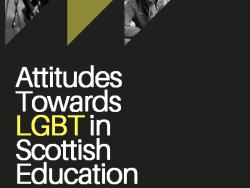Half of Scottish teachers did not read government guidance on LGBT-inclusive education

15 September 2016 - Fifty-five of Scottish teachers say they did not know or read the government guidance on LGBT-inclusive education. The research was done by TIE (Time for Inclusive Education), which campaigns for adequate implementation of anti-bullying schools policies. This week, the TIE campaign launched a report highlighting high rates of bullying, attempted suicide, self-harm and mental health issues among LGBT young people.
Guidance does not equal implementation
In 2014, Scotland updated its Relationships, Sexual Health and Parenthood (RSHP) education guidance to include LGBT issues. Scottish Education Secretary John Swinney recently said he was confident that the guidance would address issues facing LGBT learners. However, the TIE research revealed that 55 per cent of teachers said they had not read or did not know about the guidance and 35 per cent said that they did not feel that the materials were good enough.
A TIE spokesperson said: "There is a culture of silence around LGBT in most classrooms across the country, and we should not be satisfied until all schools are fully inclusive of LGBT issues and identities in order to ensure that all of our young people can thrive and achieve their full potential in a safe and supportive learning environment.
TIE thinks there is no requirement for schools to deliver upon the LGBT inclusive guidance or more general sexual health education. "This has to be addressed. Indeed, 79 per cent of teachers agree with us that LGBT inclusive education should be a legislative requirement for all schools."
Personal roadblocks
GALE director Peter Dankmeijer comments: "It is not a surprising result. In numerous countries where the government has offered additional laws or guidance on LGBT inclusive education, teachers don't know about it or don't implement it. An active inclusive policy requires much more communication by the government, including dialogue with school boards, training of teachers and support for school on where and how to implement the attention. In addition, even in supportive countries, some schools, teachers, parents or students will feel challenged and may refuse to cooperate. This resistance, or "personal roadblocks" as I prefer to label them, need to be overcome by dialogue and training.
Sources: Pink News, the TIE report


